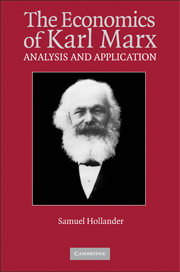Book contents
- Frontmatter
- Contents
- Preface
- Introduction
- Part One CAPITAL: PRINCIPLE FEATURES OF THE MARXIAN “CANON”
- Part Two ORIGINS: MARX IN THE 1840s
- Part Three A “SECOND DRAFT” OF CAPITAL: THE GRUNDRISSE 1857–1858
- Part Four A “THIRD DRAFT” OF CAPITAL: THE ECONOMIC MANUSCRIPTS 1861–1863
- 10 1861–1863 I: Surplus Value – Profit, Rent, and Interest
- 11 1861–1863 II: Sectoral Analysis, Accumulation, and Stability
- 12 1861–1863 III: The Labor Market
- Part Five TOPICS IN APPLICATION
- Conclusion: A Recapitulation and Overview
- Appendices
- Bibliography
- Index
12 - 1861–1863 III: The Labor Market
Published online by Cambridge University Press: 25 June 2009
- Frontmatter
- Contents
- Preface
- Introduction
- Part One CAPITAL: PRINCIPLE FEATURES OF THE MARXIAN “CANON”
- Part Two ORIGINS: MARX IN THE 1840s
- Part Three A “SECOND DRAFT” OF CAPITAL: THE GRUNDRISSE 1857–1858
- Part Four A “THIRD DRAFT” OF CAPITAL: THE ECONOMIC MANUSCRIPTS 1861–1863
- 10 1861–1863 I: Surplus Value – Profit, Rent, and Interest
- 11 1861–1863 II: Sectoral Analysis, Accumulation, and Stability
- 12 1861–1863 III: The Labor Market
- Part Five TOPICS IN APPLICATION
- Conclusion: A Recapitulation and Overview
- Appendices
- Bibliography
- Index
Summary
Introduction
In this chapter I draw freely on the Economic Manuscripts to ascertain Marx's position in the early 1860s on labor-market trends. Our first substantive section establishes Marx's rejection, following Thomas Hodgskin, of the “advances” conception of wages in favor of “synchronized” activity involving circular flow. This must be kept in mind throughout since the analysis of aggregate labor demand may give an initial impression of an “advances” orientation. Section C concerns labor demand, allowance made for ongoing technical change. Our texts point to a growth process entailing net expansion of aggregate labor demand account taken of the longer term effects of technical change and not merely the initial displacement effect. Here the sources of increased labor supply emerge tangentially, particularly the role of population growth. This issue is dealt with more closely in Section D. The main outcome is that the so-called Reserve Army of Unemployed serves as a source of labor supply for exceptional contingencies of a cyclical order; the secular path is one requiring expanded population. Section E considers the mechanics of population growth; and problems relating to the posited downward trend in the real wage.
- Type
- Chapter
- Information
- The Economics of Karl MarxAnalysis and Application, pp. 353 - 382Publisher: Cambridge University PressPrint publication year: 2008

